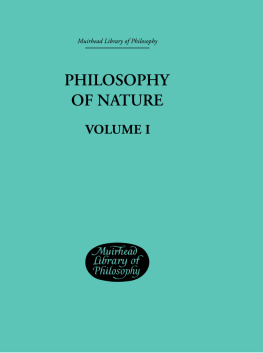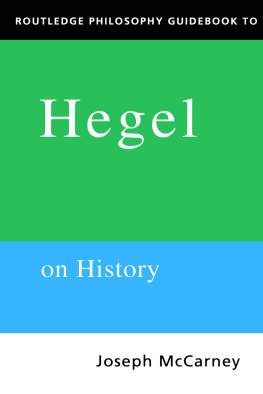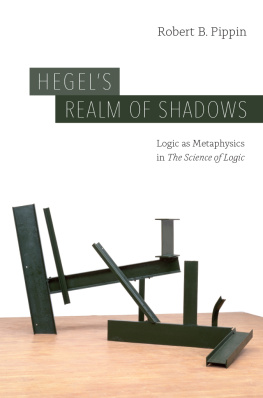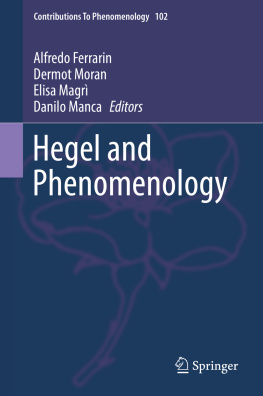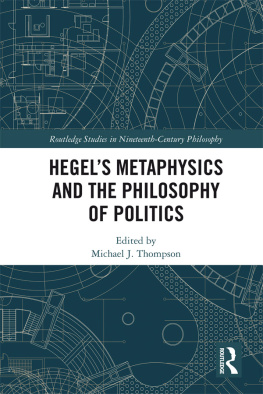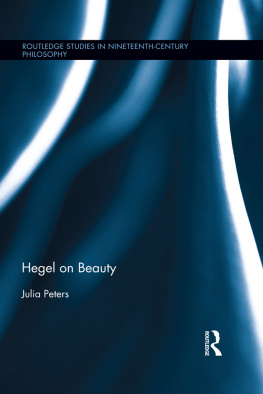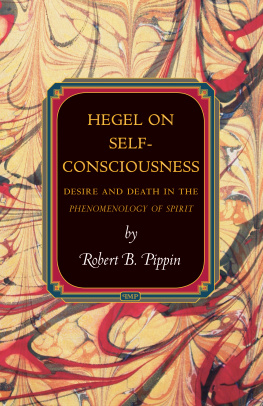Hegel 2527s Philosophy of Nature VOL1 - Hegels Philosophy of Nature VOL 1
Here you can read online Hegel 2527s Philosophy of Nature VOL1 - Hegels Philosophy of Nature VOL 1 full text of the book (entire story) in english for free. Download pdf and epub, get meaning, cover and reviews about this ebook. publisher: Routledge, genre: Religion. Description of the work, (preface) as well as reviews are available. Best literature library LitArk.com created for fans of good reading and offers a wide selection of genres:
Romance novel
Science fiction
Adventure
Detective
Science
History
Home and family
Prose
Art
Politics
Computer
Non-fiction
Religion
Business
Children
Humor
Choose a favorite category and find really read worthwhile books. Enjoy immersion in the world of imagination, feel the emotions of the characters or learn something new for yourself, make an fascinating discovery.
- Book:Hegels Philosophy of Nature VOL 1
- Author:
- Publisher:Routledge
- Genre:
- Rating:3 / 5
- Favourites:Add to favourites
- Your mark:
- 60
- 1
- 2
- 3
- 4
- 5
Hegels Philosophy of Nature VOL 1: summary, description and annotation
We offer to read an annotation, description, summary or preface (depends on what the author of the book "Hegels Philosophy of Nature VOL 1" wrote himself). If you haven't found the necessary information about the book — write in the comments, we will try to find it.
Hegels Philosophy of Nature VOL 1 — read online for free the complete book (whole text) full work
Below is the text of the book, divided by pages. System saving the place of the last page read, allows you to conveniently read the book "Hegels Philosophy of Nature VOL 1" online for free, without having to search again every time where you left off. Put a bookmark, and you can go to the page where you finished reading at any time.
Font size:
Interval:
Bookmark:

Muirhead Library of Philosophy
PHILOSOPHY OF NATURE

Muirhead Library of Philosophy
HEGEL
In 7 Volumes
| I | Hegel | Findlay |
| II | Philosophy of Nature (Vol I) | Hegel |
| III | Philosophy of Nature (Vol II) | Hegel |
| IV | Philosophy of Nature (Vol III) | Hegel |
| V | The Phenomenology of Mind (Vol I) | Hegel |
| VI | The Phenomenology of Mind (Vol II) | Hegel |
| VII | Science of Logic | Hegel |
Philosophy of Nature
Volume I
G W F Hegel

First published in 1970
Reprinted in 2002 by
Routledge
2 Park Square, Milton Park, Abingdon, Oxon, OX14 4RN
Transferred to Digital Printing 2007
Routledge is an imprint of the Taylor & Francis Group
1970 Routledge
All rights reserved. No part of this book may be reprinted or reproduced or utilized in any form or by any electronic, mechanical, or other means, now known or hereafter invented, including photocopying and recording, or in any information storage or retrieval system, without permission in writing from the publishers.
The publishers have made every effort to contact authors/copyright holders of the works reprinted in the Muirhead Library of Philosophy . This has not been possible in every case, however, and we would welcome correspondence from those individuals/companies we have been unable to trace.
These reprints are taken from original copies of each book. In many cases the condition of these originals is not perfect. The publisher has gone to great lengths to ensure the quality of these reprints, but wishes to point out that certain characteristics of the original copies will, of necessity, be apparent in reprints thereof.
British Library Cataloguing in Publication Data
A CIP catalogue record for this book
is available from the British Library
Philosophy of Nature (Vol I)
ISBN 0-415-29579-3
Hegel: 7 Volumes
ISBN 0-415-29530-0
Muirhead Library of Philosophy: 95 Volumes
ISBN 0-415-27897-X
PHILOSOPHY OF NATURE
EDITED AND TRANSLATED
WITH AN INTRODUCTION AND EXPLANATORY NOTES BY
M. J. PETRY
M.A., D.Phil. (Oxon.)
VOLUME I

FIRST PUBLISHED IN 1970
This book is copyright under the Berne Convention. All rights are reserved. Apart from any fair dealing for the purpose of private study, research, criticism or review, as permitted under the Copyright Act, 1956, no part of this publication may be reproduced, stored in a retrieval system, or transmitted, in any form or by any means, electronic, electrical, chemical, mechanical, optical, photocopying recording or otherwise, without the prior permission of the copyright owner. Enquiries should be addressed to the Publishers.
This translation George Allen & Unwin Ltd., 1970
SBN 04 100021 8
in 12 on 13 point Bembo type
Without the patience and linguistic help of my wife, this book could never have been written. Her family, and the German friends I made at Elsinore, have helped me to avoid many of the flaws generally incident to English translations from the German. I should like to express my very deep gratitude for all the help that they have given me.
Without the full co-operation of the Copenhagen Royal Natural Science Library and the University Library at Lund, I could never have undertaken the writing of the commentary. At one time it was, indeed, solely the cheerfulness, enthusiasm and efficiency with which their staffs helped me to trace references and acquire books, that encouraged me to believe that the work I had undertaken was completable.
I should like to acknowledge my indebtedness to Father F. C. Copleston S.J., whose perspicacity and tolerance made my work on Hegel at Oxford so rewarding and enjoyable, and to Sir Malcolm Knox and Professor W. B. Lockwood, who recommended my finished labours to the publishers.
M.J.P.
Reading
August 1968
| by K. L. Michelet |
The words in roman are those of Hegel's headings which appeared in the first edition of this work. The words in italics do not appear as headings in the text, but such identification of these passages was made on the contents page of the first edition of the work.
'Systems are useful not only in that one thinks about matters in an orderly manner, according to a certain plan, but in that one dunks about matters at all. The latter use is undoubtedly greater than the first.'G. C. Lichtenberg.
If the Hegelian system is to be fully appreciated, it has to be grasped as a whole. Experience has shown that this is no easy matter, not only because the general principles involved in its structuralization have never been clearly presented and effectively criticized, but because, in the range of its subject matter, it is so bewilderingly comprehensive. Hegel's own teaching experience had made him aware of the difficulties involved in communicating satisfactorily however, and it was mainly in order that bis system might be conveniendy considered in its entirety that he produced his 'Encyclopaedia'. This work, which is therefore central to any understanding of his manner of thinking, was designed as a general guide to the courses of lectures he delivered at Heidelberg and Berlin between 1816 and 1831. As it was primarily a teaching book, he was constantly revising it, and during his lifetime three editions of it were prepared for the press (1817, 1827, 1830). The lectures were designed mainly for undergraduates, and it is therefore a consideration of Hegel as an encyclopaedist and a teacher which provides one of the readiest introductions to his philosophical system.
The problems facing encyclopaedists have changed very little since the beginning of the last century. Then, as now, most specialists were unwilling or unable to assess their disciplines in a satisfactory manner within any comprehensive or systematic exposition of knowledge as a whole. Aristotelianism had long since ceased to dominate the university teaching of Europe, and most philosophers, as philosophers, were as incapable as they are today of saying anything very helpful about the labours and problems of their academic colleagues and fellow citizens. Then, as now, the need for a synoptic view of knowledge was forced upon the notice of specialists as fresh discoveries gave indications of formerly unsuspected connections, especially in the natural sciences. Then, as now, various attempts were made to evolve such a view from inadequate premises and ephemeral interpretations, and then, as now, these attempts were overvalued and capably criticized.
The encyclopaedists of Hegel's day had already begun to assess this state of affairs in much the same way as their present-day counterparts. Philosophical encyclopaedias, such as Hegel's, were generally regarded as unsatisfactory in that they tended to impose a more or less arbitrary structuralization upon subject matter which was to be acquired in a much more trustworthy and intelligible manner from the specialists themselves. tienne Chauvin (1640-1725), a French Huguenot pastor living in Berlin, had attempted to expound Cartesianism in an encyclopaedic form in his 'Lexicon rationale' (Rotterdam, 1692), Christian "Wolff (1679-1754) had attempted to scholasticize Leibniz in a similar manner, and J. J. Eschenburg produced the Kantian equivalent of their work in his 'Lehrbuch der Wissenschaftskunde' (Stettin and Leipzig, 1792). It was generally realized that writings of this kind merely emphasized the limitations and datedness of the philosophies on which they were based, and the irresponsible extravagances of Schellingianism finally brought the whole concept of philosophical encyclopaedias into disrepute. The effect of organizing knowledge in order to further particular ends had become evident in the success of Bayle's 'Dictionnaire historique et critique' (2 vols. Rotterdam, 1697) and Diderot's 'Encyclopedic, ou Dictionnaire raissone des sciences, des arts et des mtiers' (35 vols. Paris, 1751-1780) in creating and consolidating the intellectual atmosphere of the eighteenth century enlightenment. Although they are basically similar to the purely philosophical encyclopaedias, works of this kind have now proved their social effectiveness, and are therefore still compiled and countenanced by certain interests, regimes and churches. As they have never completely succeeded in integrating their subject matter into the ends for which they have been written however, they have generally been criticized for their lack of 'objectivity'.
Font size:
Interval:
Bookmark:
Similar books «Hegels Philosophy of Nature VOL 1»
Look at similar books to Hegels Philosophy of Nature VOL 1. We have selected literature similar in name and meaning in the hope of providing readers with more options to find new, interesting, not yet read works.
Discussion, reviews of the book Hegels Philosophy of Nature VOL 1 and just readers' own opinions. Leave your comments, write what you think about the work, its meaning or the main characters. Specify what exactly you liked and what you didn't like, and why you think so.

